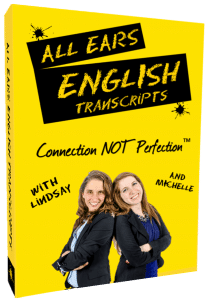
Have you ever heard somebody talk about or use an “if/then” statement?
Do you struggle with conditionals and tough grammar forms in English?
We’re going to look at what these are today, how they work, and what the best ways to use them in conversation can be.
Remember that as with any aspect of vocabulary and conversation, it’s all about practicing and sounding natural rather than rehearsed if you want to connect with native English speakers.
Today we have a question about conditional sentences in English from a listener.
Get Your Transcripts Today!

Make sure you understand every word you hear on All Ears English.
Bring your English to the advanced level with new vocabulary and natural expressions.
Subscribe and get the transcripts delivered by email.
Learn to speak naturally with the American accent.
Hi Lindsay and Michelle,
I think its been almost 2 years that I’ve been listening to your podcast. I found you just in time for the TOEFL test. It helped me a lot, I got a full speaking score on the test. And now I’m going for my PhD in Canada as I’ve always wanted.
You are doing a great job teaching us expressions, chunks of words, connection rules, and things like that. There is only one thing that after many years of practice is not easy for me. And that’s the conditional sentences. I know there are 3 or 4 types of them. I’ve read lessons on this many times. But I’m not comfortable using them in my daily conversations, and yet I know that they are very useful.
I would appreciate it if you could teach us conditional sentences in one of your episodes. I’m sure I’ll master them after I hear you teaching them. I always repeat after you and that’s how I learn things so fast.
Love you guys,
Sahar
Covering Functional Grammar
Today we are going to cover grammar–don’t worry we will make it fun!
What is a conditional?
People usually think of conditionals as “if” statements.
This is exactly right. There are four of them in total.
1st, 2nd, 3rd, and zero are how they break down overall.
Today we will focus on the first one and do a follow up later on the rest of them.
So we’re looking at the first conditional which is centered around “if, then” type of statements.
Breaking This Down
When you look at these statements they follow a specific type of pattern.
This focuses on real life in the future, which means that it shows something that is likely to happen.
Other conditions are different, even if only slightly.
This can be with plans, possibilities, and things of that nature.
The structure is a combination of the present and future simple, and therefore they are dependent or contingent upon each other.
IF present simple, THEN future simple, or IF present simple, THEN will and the infinitive.
You may have to see this at work to understand exactly how it plays out and functions in a sentence.
Using These In Real Life Conversations
These work well in conversations and they are a natural fit.
That being said, you want to start to see this dependent relationship at work.
Here are a few examples that demonstrate how the “if/then” statements work:
- If I finish my work on time, I will leave by 5pm.
- If she gets into NYU, she will move to New York.
- If I have any trouble, I’ll give you a call.
You can also switch the order and they work in the same way:
- I will leave by 5 pm if I finish my work on time.
- She’ll move to NY if she gets into NYU.
- I’ll give you a call if I have any trouble.
You can also use “I will” or “I’ll” and it can still work as an “if/then” statement too.
This Helps With Connections
So with this grammar, you can actually connect with people!
You might be wondering exactly how that works.
It’s important to talk about plans with people, as that is often what conversation centers around.
This may be sharing information about yourself or connecting with someone by making plans for the future–it may even be telling them plans have changed.
It’s helpful if when trying to remember the conditionals you remember the purpose, not just the grammar.
Remember that as with any aspect of grammar and conversation, you want it to sound natural and never rehearsed.
Practice using these conditionals in conversation, and see how they just work for you without even giving it much thought.
So we are giving you some ideas today to help you with this very thing!
Seeing These Work In Real Life
When it comes to certain aspects of grammar, sometimes you have to see this work firsthand.
Here are a couple of roleplays so that you can see how this works and start to visualize how you can practice these.
M: Do you like guacamole?
L: Yes I love it but now I have an allergy to avocados. If I eat a few bites of guacamole, I will break out in hives.
M: Oh wow I didn’t know that Lindsay!
L: Michelle, I might be late to dinner tonight.
M: Oh no! When will you know for sure?
L: I’ll text you later. If my boss doesn’t add 20 minutes to our meeting like usual I will be on time.
M: If I can’t find your house what should I do?
L: I’ll wait outside if you have trouble finding my place. I’ll make sure you see me!
Takeaway
It’s easy to get bogged down by grammar, but think of learning grammar in terms of how you can use it in your daily life.
Take the first conditional now that we have reviewed it and think about how it applies to your everyday life.
How can you use it?
That’s the best way to work on grammar, and make it a natural part of your conversations.
This helps to boost your confidence in conversations, and ultimately ensures that you make great connections.
If you have any questions, please leave them below in the comments section.
We’ll get back to you as soon as we can.








